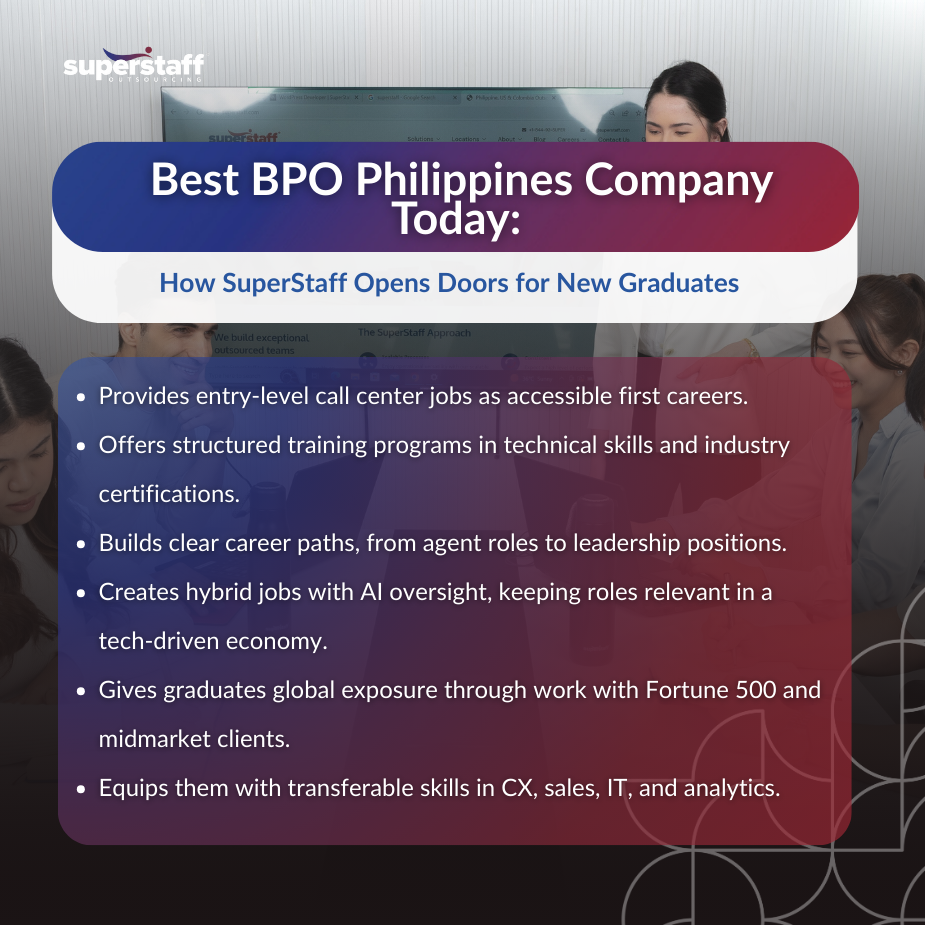
AI is no longer just a buzzword; it’s actively taking over tasks that once defined the first step into the workforce. From customer inquiries to basic data entry, automation now handles jobs that were traditionally reserved for fresh graduates, sparking concerns about whether entry-level careers are disappearing.
Chatbots manage customer interactions at scale, self-service portals reduce the need for human support, and AI-powered systems streamline repetitive tasks. These innovations are reshaping traditional career pathways, leaving many young professionals questioning where they fit in an economy increasingly run by algorithms.
Yet, amid this shift, the best BPO Philippines companies are proving that opportunities for new graduates are far from gone. By creating roles that combine technology with uniquely human skills, they continue to serve as a vital bridge between education and long-term career growth.
This blog explores how BPOs empower the next generation of professionals, equipping them with global exposure, essential skills, and a resilient career path—even in an AI-driven economy.
Concerns About AI Replacing Entry-Level Jobs Are Growing Worldwide
Across the globe, automation tools and generative AI are replacing tasks once handled by fresh graduates. This shift is particularly visible in industries that traditionally absorbed large numbers of new workers.
Manual data entry, for instance, has largely been replaced by AI-powered systems that can scan, interpret, and store information far more quickly than human workers. What used to be an entry-level gateway role has now become almost fully automated.
Customer service has undergone a similar transformation. Chatbots and self-service portals now handle the “first line of defense” for customer inquiries, eliminating the need for entire tiers of entry-level staff. The same trend extends into technical fields where basic troubleshooting or system monitoring can now be managed by AI-driven tools.
In developed economies, this has led to a perception that entry-level jobs are “at risk” or, worse, obsolete. For young graduates, the path into the workforce is more uncertain than ever.
Yet, the best BPO Philippines companies tell a different story—one of resilience, adaptation, and opportunity.

The BPO Industry in the Philippines Remains a Launchpad for Young Professionals
Despite the global tide of automation, the BPO sector in the Philippines continues to absorb thousands of fresh graduates every year. This resilience lies in the uniquely human qualities that remain irreplaceable in customer experience and global operations.
Empathy-driven customer support, for instance, is in higher demand than ever. While AI can answer questions, it cannot navigate the nuances of frustration, build rapport, or de-escalate emotional conversations. Filipino workers, known for their cultural warmth and ability to empathize, excel in these areas.
Communication strength is another factor. Graduates in the Philippines consistently demonstrate strong English proficiency, making them valuable assets for global companies that need customer-facing teams aligned with Western markets.
For many, entry level call center jobs remote or on-site become the first step toward building a career in a competitive global environment. These opportunities highlight why the best BPO Philippines companies remain trusted partners not only for global businesses but also for new graduates navigating uncertain labor markets.
But beyond simply providing jobs, BPO companies in the Philippines are building structured pathways for long-term career development.
BPO Companies Invest Heavily in Training and Skills Development for New Hires
One of the strongest differentiators of the BPO industry in the Philippines is its commitment to training and professional development. Unlike many industries that expect graduates to “figure it out,” BPOs provide structured onboarding that equips employees with the skills they need to thrive.
Language and communication training is often the starting point. Even those with strong academic backgrounds benefit from practical coaching in customer engagement, negotiation, and problem resolution.
Technical and industry-specific certifications are also common. From healthcare compliance to financial services knowledge, new hires are prepared to handle specialized accounts that expand their professional expertise.
Leadership and career progression tracks ensure that fresh graduates don’t stay “entry-level” for long. Many who start with BPO jobs for new graduates in the Philippines advance into supervisory or managerial roles within just a few years, thanks to clear and merit-based career ladders.
These programs highlight why the BPO sector is not just filling roles but actively preparing the next generation for sustainable careers in a fast-changing economy.
And while entry-level roles remain, they are also evolving into more dynamic opportunities shaped by AI.
Entry-Level Opportunities in BPOs Are Evolving Rather Than Disappearing
AI has not eliminated opportunities in the Philippine BPO sector; it has transformed them. Rather than making entry-level roles irrelevant, it has created hybrid positions that blend human oversight with AI-driven efficiency.
Take customer service, for example. Chatbots may handle routine questions, but human agents step in for escalations, guiding customers through complex or emotional issues. These roles often involve monitoring AI responses for accuracy, requiring a balance of technical skill and emotional intelligence.
New pathways are also opening in fields like analytics, digital marketing, and AI supervision. These are areas where graduates can apply their fresh perspectives and digital fluency while developing specialized expertise.
Knowledge-based roles, such as compliance monitoring, financial analysis, and healthcare support, are also expanding. For graduates, these jobs offer a chance to enter industries that would otherwise be difficult to access directly.
By evolving entry-level opportunities rather than eliminating them, the best BPO Philippines companies demonstrate their adaptability and resilience in the face of technological change.
Beyond evolving job functions, the sector also provides a kind of career growth unmatched by many other industries: global exposure.
BPOs Provide Global Exposure and Career Mobility for Graduates
One of the defining features of outsourcing to the Philippines is the global exposure it offers local talent. New graduates working in BPOs often interact directly with international clients, building cultural fluency and professional versatility from day one.
This exposure includes working with Fortune 500 firms as well as innovative midmarket companies, giving employees a portfolio of experiences that rivals those of more seasoned professionals elsewhere.
The skills gained in these roles are transferable across industries. Customer experience, sales, technical troubleshooting, and project management are competencies that graduates carry forward into new opportunities, whether within BPOs or in other sectors.
Opportunities for career mobility are equally significant. Many professionals who began with entry level call center jobs remote have transitioned into roles in IT, finance, and even entrepreneurship.
For young professionals, BPOs don’t just provide jobs; they provide steppingstones to global careers.
At the same time, the industry’s inclusivity and accessibility make it a cornerstone of economic progress in the Philippines.
The Philippine BPO Industry Supports Economic Mobility and Inclusion
The impact of the BPO industry extends far beyond individual careers. By making entry-level roles widely accessible, it has become one of the most significant drivers of economic inclusion in the country.
For graduates from diverse socioeconomic backgrounds, BPO jobs for new graduates in the Philippines often represent a first stable income. This income does more than sustain individuals; it supports families, enables higher education for siblings, and improves entire communities.
The steady growth of the sector has also played a pivotal role in building the Philippine middle class. BPOs are not just providing jobs; they are fueling social mobility at scale.
Even as AI reshapes industries worldwide, the Philippine BPO sector continues to ensure that opportunity remains within reach for graduates, regardless of background.
This social impact underscores why BPOs are not just relevant but indispensable for the future of work.
Kick-Start Your Career With the Best BPO Philippines Company Today
While AI is reshaping the global workforce and redefining career pathways, the Philippine BPO industry continues to be a reliable gateway for new graduates to build meaningful and sustainable careers. From empathy-driven customer support to hybrid AI-human roles, from global exposure to community upliftment, the sector ensures that opportunity is not only preserved but expanded.
By offering structured training, clear career paths, and jobs that adapt alongside technology, the best BPO Philippines companies prove that the future of work doesn’t have to mean fewer opportunities for young professionals. Instead, it can mean better, smarter, and more globally connected ones.
For businesses seeking adaptable and human-driven solutions, outsourcing to the Philippines is more than a cost-saving strategy. It’s a partnership that delivers future-ready operations while opening doors for the next generation of talent.






